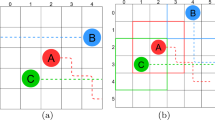Abstract
Negotiation-based resource allocation among agents is an important topic in multi-agent system research and it can be applied in various practical domains including network bandwidth allocation, robotics and grid computing. However, it is quite challenging to achieve efficient negotiation due to the huge space of all possible deals. A number of negotiation protocols have been proposed to guide the agents to reach desirable allocations over resources. However, previous work puts too much constraints on the negotiation environment and thus limits its applicability. To address this limitation, we present an efficient protocol within a more general negotiation framework, which can lead agents to achieve socially optimal allocation. We theoretically prove that the final allocation is guaranteed to be socially optimal provided that the agents are altruistic-individually rational. Besides, extensive simulation results show that the complexities of the negotiation process are greatly reduced under our protocol from both communication and computational aspects.
Access this chapter
Tax calculation will be finalised at checkout
Purchases are for personal use only
Preview
Unable to display preview. Download preview PDF.
Similar content being viewed by others
References
Arrow, K.J., Sen, A.K., Suzumura, K.: Handbook of Social Choice and Welfare. North-Holland (2002)
Brams, S.J., Taylor, A.D.: Fair division: from cake-cutting to dispute resolution. Cambridge University Press (1996)
Brams, S.J., Taylor, A.D.: The Win-Win Solution: Guaranteeing Fair Shares to Everybody. W.W. Norton and Company (2000)
Chevaleyre, Y., Endriss, U., Maudet, N.: Tractable negotiation in tree-structured domains. In: AAMAS 2006, pp. 362–369 (2006)
Chevaleyre, Y., Endriss, U., Maudet, N.: Simple negotiation schemes for agents with simple preferences: sufficiency, necessity and maximality. AAMAS 20(2), 234–259 (2010)
Chevaleyre, Y., Dunne, P.E., Endriss, U., Lang, J., Lemaître, M., Maudet, N., Padget, J., Phelps, S., Rodríguez-aguilar, J.A., Sousa, P.: Issues in multiagent resource allocation. Informatica 30, 3–31 (2006)
Endriss, U., Maudet, N.: Welfare Engineering in Multiagent Systems. In: Omicini, A., Petta, P., Pitt, J. (eds.) ESAW 2003. LNCS (LNAI), vol. 3071, pp. 93–106. Springer, Heidelberg (2003)
Endriss, U., Maudet, N.: On the communication complexity of multilateral trading: Extended report. AAMAS 11, 91–107 (2005)
Endriss, U., Maudet, N., Sadri, F., Toni, F.: On optimal outcomes of negotiation over resources. In: AAMAS 2003 (2003)
Gomoluch, J., Schroeder, M.: Market-based resource allocation for grid computing: A model and simulation. In: MGC 2003, pp. 211–218 (2003)
Maly, K., Overstreet, C., Qiu, X., Tang, D.: Dynamic bandwidth allocation in a network. In: Proceedings of the ACM Symposium on Communications Architectures and Protocols (1988)
Rosenschein, J.S., Zlotkin, G.: Rules of Encounter. MIT Press (1994)
Rubinstein, A.: Perfect equilibrium in a bargaining model. Econometrica 50(1), 97–110 (1982)
Saha, S., Sen, S.: An efficient protocol for negotiation over multiple indivisible resources. In: IJCAI 2007, pp. 1494–1499 (2007)
Sandholm, T.W.: Contract types for satisficing task allocation: I theoretical result. In: AAAI Spring Symposium: Satisficing Models (1998)
Author information
Authors and Affiliations
Editor information
Editors and Affiliations
Rights and permissions
Copyright information
© 2012 Springer-Verlag Berlin Heidelberg
About this paper
Cite this paper
Hao, J., Leung, Hf. (2012). An Efficient Negotiation Protocol to Achieve Socially Optimal Allocation. In: Rahwan, I., Wobcke, W., Sen, S., Sugawara, T. (eds) PRIMA 2012: Principles and Practice of Multi-Agent Systems. PRIMA 2012. Lecture Notes in Computer Science(), vol 7455. Springer, Berlin, Heidelberg. https://doi.org/10.1007/978-3-642-32729-2_4
Download citation
DOI: https://doi.org/10.1007/978-3-642-32729-2_4
Publisher Name: Springer, Berlin, Heidelberg
Print ISBN: 978-3-642-32728-5
Online ISBN: 978-3-642-32729-2
eBook Packages: Computer ScienceComputer Science (R0)




